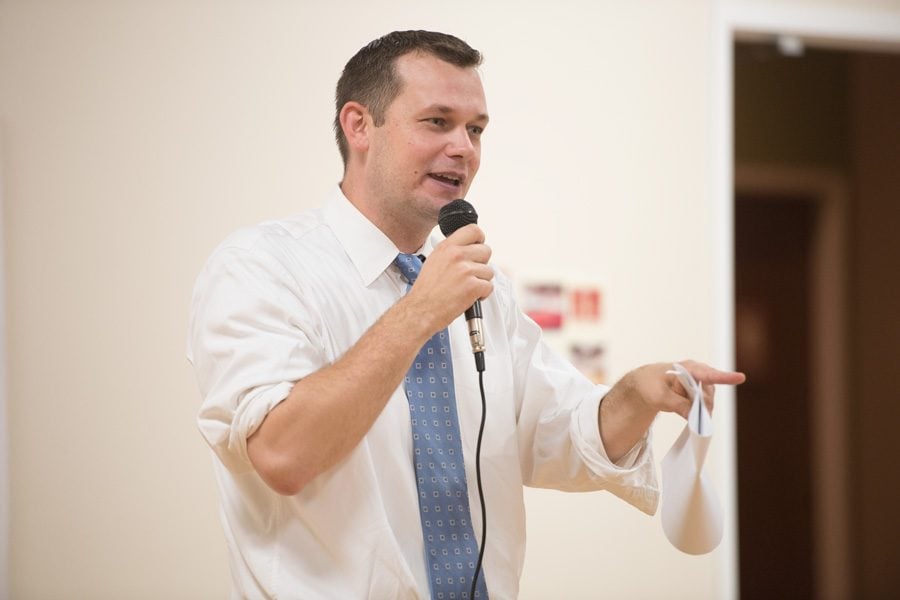City hearing on electoral objections could nix mayoral primary
Daily file photo by Colin Boyle
Ald. Brian Miller (9th) speaks at an event. Miller is one of four candidates Northwestern alumnus Jeff Smith filed objections against.
January 4, 2017
A city hearing on objections to four mayoral candidates scheduled for next week will determine whether a mayoral primary is held at the end of February, the city clerk said.
City Clerk Rodney Greene told The Daily that the electoral board will likely hear Jeff Smith’s (WCAS ‘77) objections to all of his competitors on Monday. Greene said if the board upholds the objections, Smith could be the only name on the ballot for a consolidated election in April. If it dismisses his objections, the primary will be held as announced, and early voting will start on Feb. 13.
Smith, who is a lawyer, filed his objections on Dec. 27, days after the city announced it would hold a mayoral primary ahead of the election in the spring. Smith is arguing that the new structure makes it a “greatly accelerated campaign” and is not in the interest of voters.
“People are starting to vote absentee and early in early February for a race that, at this point, I haven’t even heard when we’ll know who’s on the ballot,” Smith told The Daily last week.
Smith’s precise objections rest on the fact that some of his competitors filed for a nonpartisan election he believes is not formally required in Evanston. He also asserts that the other candidates did not submit their nominating papers in what he believes to be the only correct filing period in December.
The city’s announcement that it would hold a primary came after the electoral board rejected objections from Evanston resident William Arndt to the nominating papers of businessman Steve Hagerty and former Evanston Township supervisor Gary Gaspard, claiming they failed to mention the February primary date. During the hearing process, Arndt’s lawyers referred to a 1992 citywide referendum saying Evanston should hold a mayoral primary if more than two candidates enter the race — though the board did not consider this evidence because it wasn’t submitted in a timely matter.
Arndt is a supporter of mayoral candidate Ald. Brian Miller (9th), who said in a statement last month that he raised the issue of the 1992 referendum because it was clear Evanston was not adhering to it properly.
However, Greene, who is on the electoral board, said the decision to hold a primary is based on state law governing municipal elections — not the resurrected referendum. State law says a primary will be held in city elections if more than four candidates enter the race.
Greene told The Daily that he believed Miller wanted to “force” a primary by bringing a referendum unknown to most city officials to the surface.
“I didn’t know about it,” Greene said. “No one else knew about it.”
In an email to media, Greene said the confusion over the proper filing date began at the end of November when Miller filed his petitions on a date Greene did not believe was correct. Greene said Miller proceeded to file the petitions, and the Illinois State Board of Elections later advised him to add November filing dates to the city website. Gaspard, Hagerty and Ald. Mark Tendam (6th) then filed their papers in November.
Hagerty, who submitted his papers on the last day of the November filing period, said after Miller submitted his papers early, other candidates rushed to submit within the new window Greene had set.
“People scrambled at that point,” Hagerty said. “And taking the word of the city clerk… submitted their paperwork.”
Miller did not respond to a request for comment on how he filed his papers.
In his objections, Smith holds that the December filing period — which Greene said was the original time period listed on the city’s website — was the only valid time to file.
If no mayoral primary is required after the hearing process, Greene said, there will still be a primary for the election of Fifth Ward alderman, which has five candidates on the ballot. If a mayoral primary is held, the top candidates will proceed to the consolidated election in April. If one candidate receives more than 50 percent of the vote, they will be declared the winner outright.
Greene said early voting for the consolidated election will begin on March 20.
Marissa Page contributed reporting.
Email: [email protected]
Twitter: @juliarebeccaj


